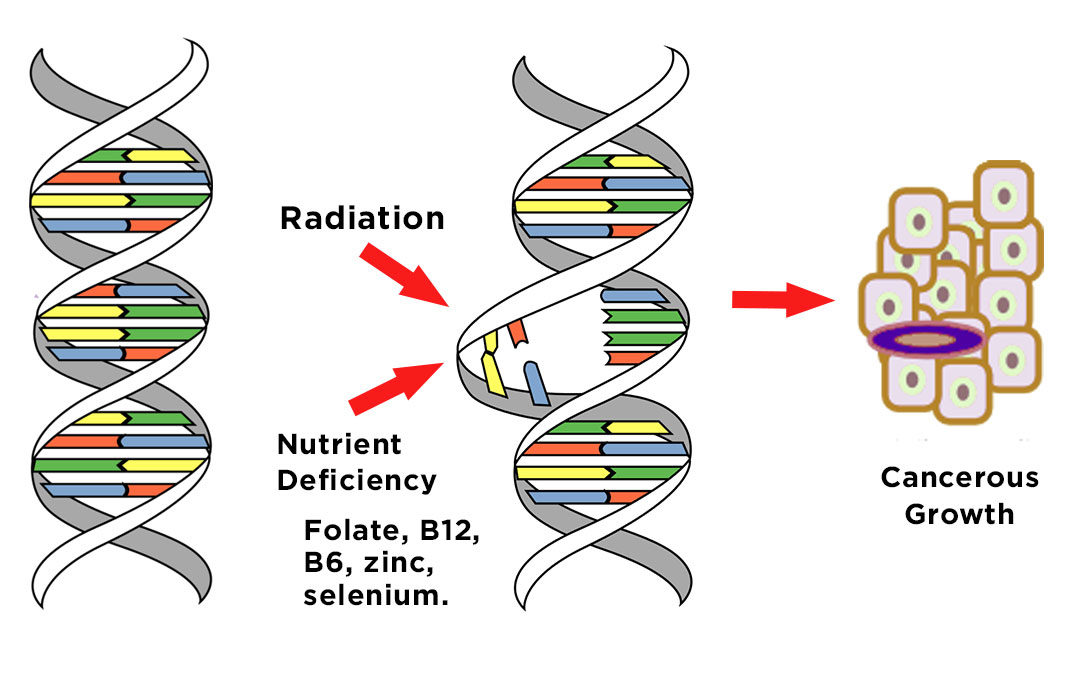How a Poor Diet Causes Cancer
Despite all the hyper surrounding genes and cancer . . . According to Pharmaceutical Research, only 5% of all cancers have a genetic link in their etiology—cause.
That means 95% of the causes of cancer are rooted in our lifestyle; our habits and our rituals—one being what we eat and don’t eat.
Jumping into the topic, all disease—yes, all disease—has a nutrient component in its etiology, its roots.
Basically, diseases including cancer, CAN be CREATED by nutrient deficiency or food toxicity. Food toxicity means that some food-borne chemicals or compounds cause damage to the body.
You may be familiar with gluten (in grain), casein (in dairy), refined white sugar, aspartame (nutrasweet), preservatives in processed meats, fluorescent food coloring, and alcohol.
Yes, gluten and protein casein from milk products cause disease.
Here’s how.
The Cause of Leaky Gut
Gluten interacts with bacteria in the gut to produce a protein called zonulin. Zonulin has been shown to cause the spaces in-between (tight junctions) of the cells that line the wall of the intestine to become permeable, or simply, leak. This allows unwanted toxins, bacteria, proteins, and other particles to pass from the gut into the bloodstream.

This causes a serious immune response that has been implicated in countless autoimmune diseases (Celiac disease, Crohn’s disease, Hashimoto’s thyroiditis, Rheumatoid arthritis), cancers of the breast, ovary, & brain, and neurological diseases including Multiple sclerosis, ALS, Schizophrenia, and autism.
Casein—the unhealthful protein found in milk products—once digested, releases the bio-active compound beta-casomorphin 7 (BCM-7). BCM-7 acts like morphine in the body and is linked to type 1 diabetes, ischemic heart disease, and sudden infant death syndrome, as well as constipation, insomnia, allergies, and other inflammatory conditions.
Milk does a body bad.
These are all toxins that we ingest.
Did you know movie popcorn can destroy your lungs?
Yes, a flavoring compound called diacetyl gives movie popcorn the smell and taste of butter. Diacetyl can cause popcorn lung—a condition of chronic scarring and severe narrowing of the bronchial airways in the lungs.
No joke! Popcorn has a disease named after it.
A crappy diet causes cancer
Nutrient deficiency is also a major cause of disease.
In cancer, a nutrient-deprived diet mimics radiation in the damage it causes to the cells’ DNA.
Dr. Bruce Ames, Professor Emeritus of Biochemistry and Molecular Biology at the University of California, Berkeley, found that deficiencies of the micronutrients folate, vitamin B6, vitamin B12, niacin, vitamin C, vitamin E, iron, and zinc cause DNA damage that will contribute to the formation of cancer. Read the research article here.
This may explain why those who don’t eat enough nutrient-dense fruits and vegetables have a much higher cancer rate.
Deficiencies of folate, vitamin B6, and vitamin B12 were found to cause breaks in certain parts of chromosomes in the same manner that radiation causes damage.
Basically, like radiation, nutrient deficiencies can cause breaks in the genetic hardware of the cell. If the cell doesn’t repair itself, it can and will cause abnormal cell growth, eventually becoming a cancer.
Deficiencies of vitamin C, vitamin D, and zinc have also been linked to the development of cancer. Vitamin C is an essential nutrient that acts as a powerful antioxidant. Oxidative stress—free-radical damage—is a major reason for the development of cancer.
According to Reviews, vitamin C supplementation was shown to prevent DNA and chromosomal damage in lymphocytes (white blood cells).
Zinc is an element crucial to the stability of DNA. A zinc deficiency was found to disrupt the repair of damaged DNA and the enzymes responsible for that DNA repair.
A deficiency of vitamin D is also linked to the development of cancer. In fact, getting one’s blood level of vitamin D to 60-80ng/ml would prevent 58,000 cases of breast cancer and 49,000 new cases of colorectal cancer each year.
So, anything less than 50-60ng/ml increases our risk of developing disease.
Countless studies in the scientific literature show that vitamins, minerals, antioxidants, and other bioactive compounds from fruits and vegetables reduce the incidence of all cancers. Taking actionable steps to prevent cancer, and to prevent a recurrence if you have had cancer treatment, includes:
- Eliminate bread (gluten), dairy (casein), and white refined sugars;
- Eliminate processed foods, food dyes, and any artificial chemicals;
- Eat nutrient-dense foods throughout the day, including plant-based foods, wild-caught seafood, grass-fed meats, healthful oils and fats, including olive and avocado oils;
- Consider supplementing with vitamins and minerals from a reputable research-based nutraceutical company.
By taking these simple steps, you will have a much better chance at protecting your DNA and preventing the development of cancer or its return.
Note: These are basic guidelines. If you are looking for the best way to create a nutrition plan that is personalized to you, get yourself a copy of REBUILD, where you create a food plan unique to your health needs.
References:
Anand P, Kunnumakara, AB, Sundaram C, et al. Cancer is a preventable disease that requires major lifestyle changes. Pharmaceutical Research, Vol. 25, No.9, September 2008
Ames BN and Wakimoto P. Are vitamin and mineral deficiencies a major cancer risk? Reviews Volume 2 Sept. 2002
Garland C, Gorham E, Mohr S, et al., Vitamin D for Cancer Prevention: Global Perspective. Annals of Epidemiology, July 2009; 19; 7:468–483.


You forgot to mention dementia!!!
Yes, nutrient deficiency—mainly B vitamin deficiencies, can cause brain-related issues and dementia. As with any health issue, it’s best to dig to find the underlying cause. Dementia has many causes: nutrient deficiency, high blood sugar and insulin, chronic inflammation etc. Whatever the health issue is, find its cause!